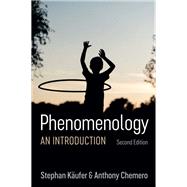A classic in its field, this comprehensive book introduces the core history of phenomenology and assesses its relevance to contemporary psychology, philosophy of mind, and cognitive science. It provides a jargon-free explanation of central themes in the works of Husserl, Heidegger, Sartre, and Merleau-Ponty. From artificial intelligence to embodiment and enactivism, Käufer and Chemero go on to trace how phenomenology has produced a valuable framework for analyzing cognition and perception, whose impact on contemporary psychological and scientific research, and philosophical debates, continues to grow.
New to this second edition are a treatment of nineteenth-century precursors of experimental psychology; a detailed exploration of Husserl's analysis of the body; and a discussion of the work of Aron Gurwitsch and other philosophers and psychologists who explored the intersection of phenomenology and Gestalt psychology. The new material also includes an expanded consideration of enactivism, and an up-to-date examination of current work in phenomenologically informed cognitive science.
This is an ideal introduction to phenomenology and cognitive science for the uninitiated, and will shed new light on the topic for experienced readers, showing clearly the contemporary relevance and influence of phenomenological ideas.








